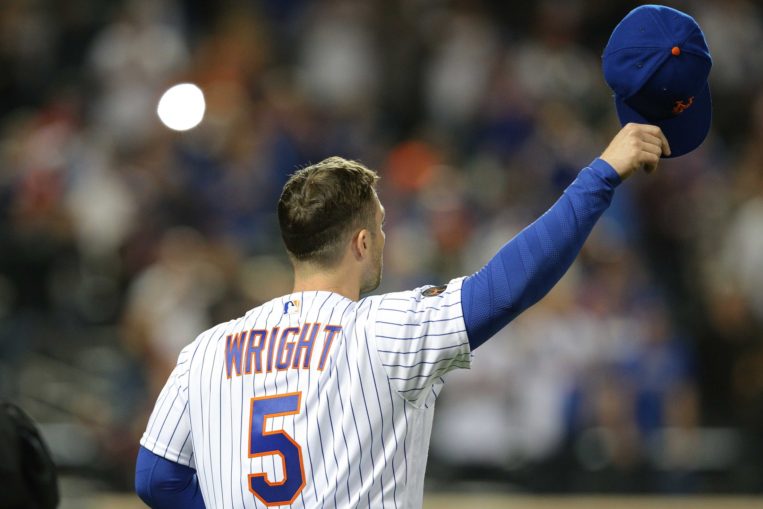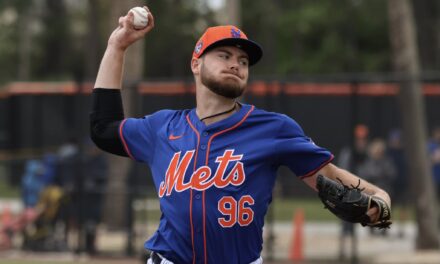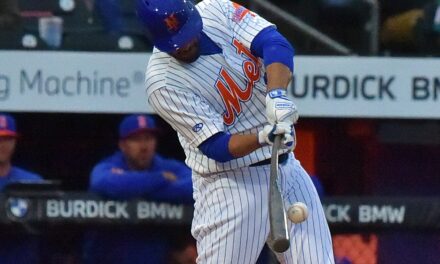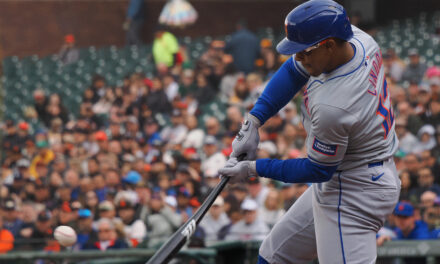There are 10 players eligible for induction into the Hall of Fame who have the Mets on some portion of their resume. We come to the final player in our series, making his debut on the ballot. He’s the only one to have spent their entire career with the orange and blue. We now present “The Captain.”
David Wright was destined to be a New York Met. It’s not often we talk about good fortune and this franchise over the last 35 years, but him on this team made sense. He rooted for the Mets growing up in the Tidewater area of Virginia, close to the team’s Triple-A affiliate. He was 2001 first-round draft pick, made his way up the minor leagues, and eventually reached the show some three years later.
The hustle and enthusiasm with which he ran out on to the field for his debut on July 21, 2004 at Shea Stadium was the same as it was on September 28, 2018 for his goodbye at Citi Field. In between were successes we could’ve seen coming and setbacks that nobody could foresee.
Wright never gave the organization any reason to doubt he was a superstar-in-waiting once he began. The necessary tools—in play and in presentation—to become the third baseman and team leader the franchise had wanted were readily present.

Through the 2013 season, Wright had 222 homers, 1,558 hits (the most in Mets history), 183 steals, and a .301/.382/.506/.888 slash line. His OPS+ was 137 and his bWAR was at 46.5. His 162-game averages were 184 hits, 41 doubles, 26 homers, 103 RBI, 101 runs, 22 steals and 5.1 WAR. In other words, a Hall of Fame pace.
He ended up a career .296/.376/.491 hitter, which was good for a 133 OPS+. He collected 1,777 hits, 390 doubles, 26 triples, 242 home runs, 970 RBI, 949 runs and 196 stolen bases.
Beyond the standing ovations, the tears, the thank yous, and the recounting of great performances and records that occurred when he said goodbye on the next-to-last day of the 2018 regular season, a bittersweet feeling lingered. Wright holds nearly every meaningful Mets hitting record. He’s the all-time leader in at-bats and has played the second-most games in orange and blue. There’s a strong case for Wright being the greatest position player the team has ever had, with a 50.4 WAR that’s second only to Tom Seaver.
But David Wright got cheated. His body betrayed him. He is one of the great “what ifs.” We often imagine what could have been. Now as he makes his first appearance on the Hall of Fame ballot soon find out what is.
“Never would I have thought that I would have been in this situation,” Wright said to MLB Now on Monday, reflecting back to his youth. “Even having this conversation is almost a ‘pinch me’ moment. Whether it happens or whether it doesn’t, I really appreciate the consideration.”
“I reached that goal of not having any regrets and leaving it all out on the field.”
The Case For
If we look at David Wright for the first ten years, it stacks up extremely well. After a decade in the majors, from 2004-13, Wright had more bWAR than 20 current Hall of Fame position players, whose careers began in the expansion era (1961-present). Only six retired third basemen from that era were ahead of him: Wade Boggs, Mike Schmidt, Ron Santo, George Brett, Chipper Jones and Scott Rolen. All of them are in the Hall.
Wright is one of eight hot corner occupants to have at least eight seasons with an OPS+ of 124 or better. Schmidt (11), Eddie Mathews (11) and Brett (10) all had more. Jones, Boggs, Santo, and Role each had eight themselves.
Looking closer at his numbers, Wright’s extra-base hit production is especially impressive. He tallied at least 40 doubles and 20 home runs in five seasons: 2005-08 and 2012. That’s the most by any third baseman ever. For four consecutive years (2005-08), he had at least 70 extra-base hits. The only other third baseman to have longer streaks is Nolan Arenado and Schmidt.
Just four players from that era—regardless of position—have many homers, steals and wins above replacement in their first 10 seasons: Wright, Mike Trout, Barry Bonds, and Bobby Bonds.
The Case Against
It comes down to three words: longevity, longevity, longevity. As good as those first 10 years were, they needed to be even better to make up for the the lack of service time and production in the succeeding years.
Wright had only four seasons with a WAR higher than 5, the best being 8.3 in 2007. That year was an MVP-type year, and should’ve been if not for the rest of the team crumbling around him. As it turns out, he finishing fourth and was never in the top three throughout his career. To many, his peak is great—but not great enough.
In terms of the JAWS metric, which accounts for the top seven WAR seasons, Wright is 26th. He trails Darrell Evans, Robin Ventura, and Ron Cey (none of whom are in the Hall). Among third baseman, Wright is 49th all-time in hits, 44th in runs, 21st in doubles, tied for 34th in homers, and 42nd in doubles.
As Jayson Stark pointed out in a recent Athletic article, his case is similar to that of Kirby Puckett, who had to retire prematurely because of sight issues and made the Hall of Fame on his first try in 2001. But where the Twins outfielder differs, among several areas, from the Mets third baseman is in games played and postseason success.
Puckett won two rings and delivered a World Series Game 6 walk-off homer in 1991. Wright has two postseason trips and including the 2015 World Series and slashed .198/.311/.319 in 24 postseason games—his memorable Game 3 homer notwithstanding.
This was yet another occurrence that was mostly caused by circumstances out of his control.
Final Thoughts
This is a heart vs. head debate. I’m in the “he’s a Hall of Famer or he’s not” camp rather than taking time to think about it. But biases and affection take over here. I’m hopeful he gets a closer look beyond a year or even two. David Wright’s case is a unique one. It deserves closer examination and, perhaps, one that is deemed worthy of induction buy a segment of voters. He may not be a Hall of Famer in reality, but he is in our imagination—one that is free of injury.















